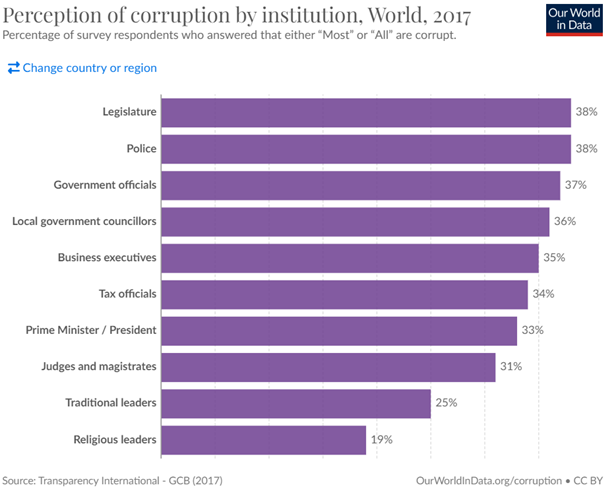There has been a rash of corruption charges surrounding political figures recently, and the initial response of most of the accused is to claim innocence. Transparency International explains, “A corrupt act implies the abuse of entrusted power for private gain.” Classic examples include bribery, self-dealing, and embezzlement. Other more subtle and sometimes even legal examples of corruption include lobbying and patronage.
However, innocence or guilt is not the deciding factor in how corruption affects people. Corruption has economic impacts, which can lower the quality of life, and quality of government services, thus indirectly affecting happiness, but it is the perception of corruption that directly affects well-being.
Lawmakers and the courts cite psychological impacts as the main reason to prosecute corruption. The impact of corruption is so important that even the appearance of impropriety or indirect personal interests in government contracts by government officials, whether or not intentional or not for the purpose of financial gain, is illegal. Nor do the courts let it slide if an act is committed simply in the hope of financial gain, but no gain transpires. One court noted that the hope of financial gain harms the public just as much as when a public official is motivated by certain financial gain.
In California, even if a public official discloses his or her financial interest in a public agency decision and does not participate in or vote on the matter, the remaining board is still prohibited from entering into a contract in which the board member has an interest. The prohibition applies even when there is only a possibility of a financial benefit. It does not matter whether the official’s financial interest is positively or negatively affected. When the official enters into a contract that is later found to be in violation of the law, the official has committed a crime. This is true even when the official did not intend to secure any personal benefit and even if the official did not intend to violate the law. The penalties are both civil and criminal and may include large fines, a felony conviction, and jail time.
The rationale is that a person cannot effectively serve two masters. The purpose is to eliminate temptation, avoid the appearance of impropriety, and assure the public of the official’s undivided and uncompromised allegiance to the public’s best interest.
The International Foundation for Electoral Systems notes that “corruption undermines the efficiency and efficacy of government and erodes public trust in democratic institutions. High corruption perception levels are enough to cause negative economic effects, causing institutional instability and the deterioration of relationships among individuals, institutions, and states.”
Corruption data usually comes from either direct observation, such as law enforcement records and audit reports, or public opinion surveys of perception, as shown in the Transparency International chart. Subjective well-being is the sense of well-being as reported by individuals and refers to a broad psychological phenomenon, including feelings, information, and perception, which are emotional and cognitive aspects of happiness.

Transparency International Worldwide Corruption Perception Index
Source: Transparency International/No Derivs 4.0 International
Good governance will foster a sense of fairness and trust, which are known as contributors to enhanced well-being (Helliwell and colleagues, 2017). One of the most important indicators of good governance is low levels of corruption. It is also now recognized as a major factor affecting citizens’ subjective well-being. Other studies show correlations between corruption and higher incidences of depression.
In a July 2022 study of 3,033 Chinese respondents—Perception of Official Corruption, Satisfaction With Government Performance, and Subjective Wellbeing, an Empirical Study From China—psychologists Ma Jiazheng, Guo Bin, Yu Yanghang concluded that high levels of corruption perception could have more devastating effects than corruption itself. The authors find a clear correlation between perception and behavior because corruption generates a “culture of distrust” towards institutions and may create a cultural tradition of gift-giving, thus increasing corruption.
The authors point out that governments have become the strongest organizations in our society because they possess so many resources and that perception of corruption harms well-being. Conversely, satisfaction with government performance mediates the perception of official corruption and supports well-being.
In the final analysis, around the world, the courts and psychologists find that ethical lawmakers must avoid even the appearance of corruption if they are to serve the best interests of their constituents.



















+ There are no comments
Add yours